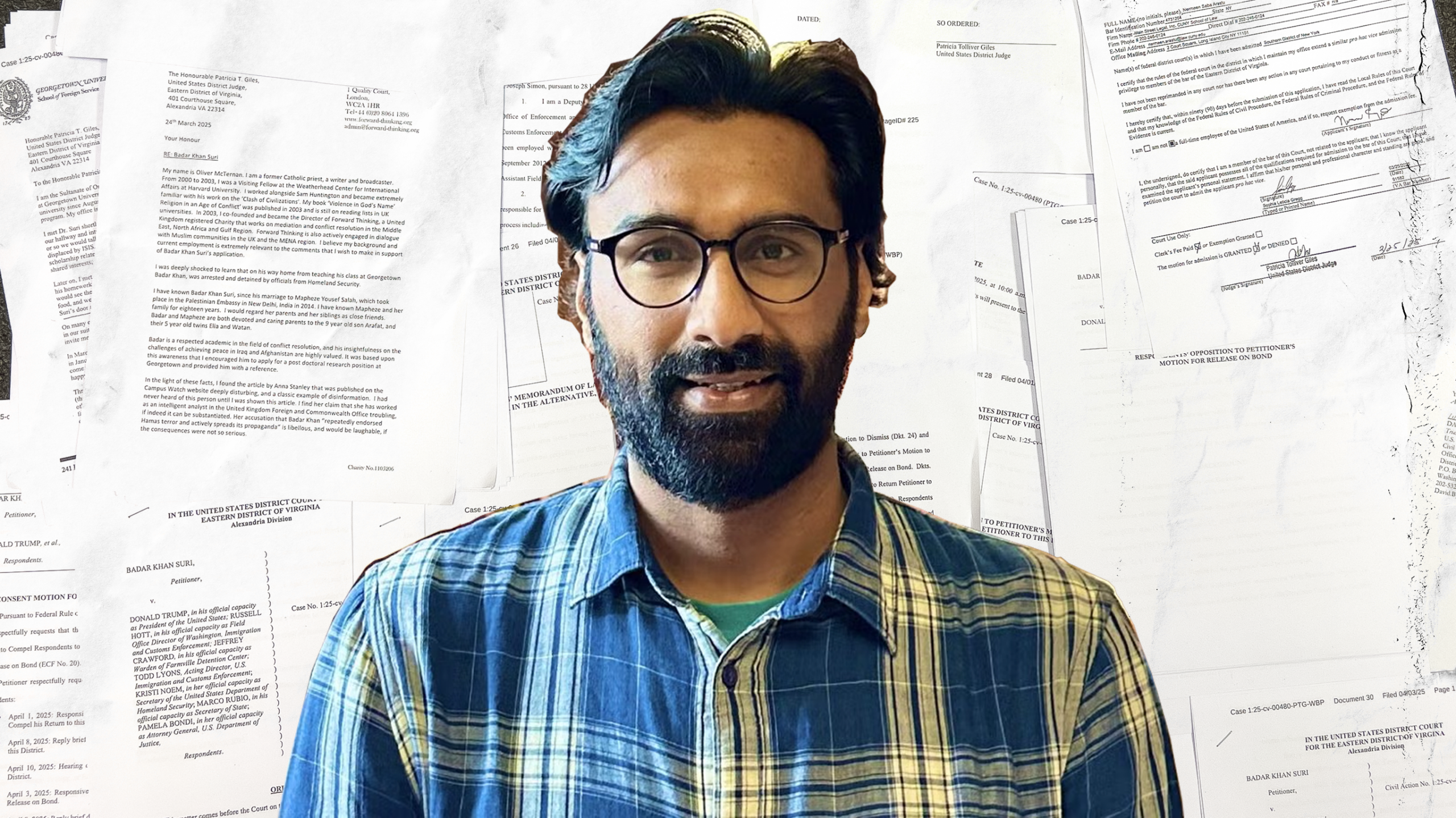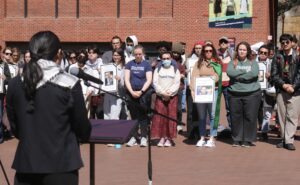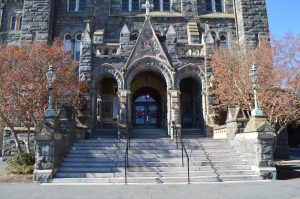Since the Department of Homeland Security (DHS) detained Dr. Badar Khan Suri, a Georgetown postdoctoral fellow, on March 17, the Voice has obtained dozens of court documents filed by the legal teams for Khan Suri and the federal government.
Khan Suri is a researcher at Georgetown’s Alwaleed Bin Talal Center for Muslim-Christian Understanding (ACMCU) and an Indian national who is in the U.S. legally on an exchange visa. Many of Khan Suri’s students have deemed his detention to be retaliation for his free speech and his familial ties to Hamas.
On March 20, federal judge Patricia Tolliver Giles ruled that Khan Suri cannot be removed from the country before his case is heard before a court.
Here’s what the court filings in Khan Suri’s case say.
Khan Suri’s current status
Khan Suri’s legal team is requesting that he be returned to Virginia and released on bond until the date of his trial. Khan Suri is currently being held in the Prairieland Detention Center in Alvarado, Texas, according to the Immigration and Customs Enforcement (ICE) detainee locator system.
In an April 1 filing, DHS alleged that Khan Suri should be removed from the U.S. because “the Secretary of State has determined that [his] presence or activities in The United States would have serious adverse foreign policy consequences.” Despite 36 separate filings, Khan Suri has yet to be charged with a crime.
Khan Suri is married to Mapheze Ahmad Saleh (MSFS ’26), a U.S. citizen born in Missouri but primarily raised in Gaza. According to a 2018 interview with the Hindustan Times, Saleh’s father was a “senior political advisor” to Hamas. Saleh’s father left the group and publicly condemned its attacks on Israel on October 7, 2023, calling them a “terrible error.” Following a February article by CAMERA on Campus, a nonprofit dedicated to “defending Israel against hostility and distortions on campus,” Saleh became the target of online scrutiny for her father’s association with Hamas, which included “doxxing and harassment,” according to a March 27 filing.
On March 19, DHS spokesperson Tricia McLaughlin wrote on X that Khan Suri was “actively spreading Hamas propaganda” and that he has “close connections to a known or suspected terrorist, who is a senior advisor to Hamas.”
Khan Suri’s legal team continues to deny any association between Khan Suri or Saleh and Hamas. The March 27 filing also says that Khan Suri has only met his father-in-law twice in person, and that their telephone conversations were “infrequent.”
On March 19, two days after Khan Suri’s detainment, Khan Suri’s lawyers filed a petition alleging that the Trump administration violated his free speech rights under the First Amendment and right to due process under the Fifth Amendment.
Timeline based on filings by Khan Suri’s legal team
Khan Suri’s case comes as the Trump administration has detained non-citizens across the country who are critical of the government and the U.S.’s relationship with Israel. Two weeks before Khan Suri’s detainment, ICE officials arrested Mahmoud Khalil, a Columbia University graduate, with the Trump administration advocating for his deportation. Khalil, who is a green card holder, was among the organizers of Columbia’s pro-Palestine protests last spring.
In the month since Khalil’s arrest, at least 147 international students at U.S. universities have had visas revoked and could face deportation. Many of these students have not been provided a reason for their loss of legal status.
Dispute over jurisdiction
On April 1, the Trump administration filed a motion calling for Khan Suri’s legal team to either request a transfer of Khan Suri v. Trump to be tried in the Northern District of Texas, where Khan Suri is currently held, or dismiss the case entirely so that Khan Suri’s counsel can refile it in that district. They argue that the Eastern District of Virginia should dismiss Khan Suri’s suit, as he was not in the Eastern District of Virginia at the time the suit was filed—because he was physically in Louisiana after being moved by DHS.
Khan Suri’s legal counsel is pushing for his case to be tried in the Eastern District of Virginia, as that’s where he was arrested and where they allege the unlawful detainment took place.
Release on bond
Khan Suri’s legal team is fighting for him to be released on bond until his hearing, which is currently scheduled for May 1. A March 27 memorandum filed in support of his release on bond argued that keeping Khan Suri in detention when he poses no threat to the community is unnecessarily punitive.
“Dr. Khan Suri is being held punitively simply because he is associated with his U.S. born wife of Gazan descent,” the memorandum states. “There are no allegations of personal guilt, danger, or flight risk that could justify such detention.”
His counsel also argued that keeping Khan Suri in detention limits his access to legal representation, with him already being kept in another region of the country.
Khan Suri’s lawyer, Hassan Ahmad, also alleges in a personal declaration that he was only first granted a confidential meeting with Khan Suri on March 25, eight days after his detainment. The two had never met prior.
Details of Khan Suri’s arrest and detainment
The March 27 filing revealed new alleged details about Khan Suri’s detainment and current conditions in federal detention. According to the memorandum, during his initial detainment, Khan Suri continually asked officers why he was being arrested. An officer allegedly responded, “social media.” There is also now a video available of Khan Suri’s arrest, seemingly filmed from an apartment overlooking the road, that shows masked DHS agents confronting Khan Suri and motioning him into an unmarked vehicle. While ICE transferred Khan Suri to a detention center in Chantilly, Virginia, he continued to press for answers, finally receiving an answer from another officer.
“One of the officers explained that someone at a very high level at the Secretary of State’s office did not want him to be in the country,” the March 27 memorandum said.
The memorandum alleges that in the hours after his arrest, Khan Suri was denied the chance to speak to his wife and was driven to an ICE facility in Richmond after being detained in Chantilly where he was “chained to a bench for several hours—without food, water, or access to the restroom.”
In his later transfers to prisons in Alexandria, Louisiana, and Alvarado, Texas, the documents allege ICE prevented Khan Suri from observing his faith. He was denied meals that accommodated his fasting schedule for Ramadan, as well as Halal food, a copy of the Quran, and a prayer mat, according to court filings. ICE also forced him to sleep on the floor in the common room, and dressed him in a red jumpsuit used to signify those who have been convicted of “violent crimes,” the memorandum reads.
A now-removed ICE webpage created in 2021 detailed an investigation into Prairieland Detention Center for allegations of “inadequate medical care of detainees, and environmental health and safety concerns at the facility.”
An April 3 filing by Yousuf Khan, assistant field office director in the Dallas, Texas office of ICE Enforcement and Removal Operations, claims that Khan Suri has been provided with “standard” clothing, a Quran in Arabic, and a permanent bunk. The filing also states that the detention center chaplain is coordinating Halal meals with a local Imam.
“Suri is not being prevented from practicing his faith,” Khan wrote.
Letters of support for Khan Suri
In addition to the filing by Khan Suri’s lawyer, the memorandum also included 11 letters of support for Khan Suri from Georgetown administrators, faculty members, and fellows.
SFS Dean Joel Hellman showed his support for Khan Suri in a document submitted on March 24.
“During his time on campus, I am not aware that Dr. Suri has engaged in any illegal activity, nor has he posed a threat to the security of our campus,” Hellman wrote. “He has been focused on completing his research on South Asia and teaching his students.”
Hellman also added that if Khan Suri’s visa is reinstated, the ACMCU would “consider resuming” his contract through December 31, 2026, when it was originally slated to end.
Nader Hashemi, director of the ACMCU and Khan Suri’s direct supervisor, emphasized in a letter submitted March 23 that Khan Suri was not involved in any protests or political actions while at Georgetown.
“He was not politically outspoken nor was he an activist,” Hashemi wrote. “Our center has organized a Gaza Lecture Series that has brought at least 12 outside speakers to campus. According to my recollection, Badar did not attend any of these events nor did he promote them. His priority was his academic work and taking care of his young family.”
Other letters from SFS faculty members and Khan Suri’s coworkers emphasized their relationships with him, recalling how much he and his family have become integrated into Georgetown’s community.
“Maphaz and Badar often brought their three children, who along with others’ children, would play in our common areas. I know how much our students missed their own younger brothers and sisters, and I’d often find them playing hide and seek with Badar and Maphaz’s kids,” Rochelle Davis, a professor in Georgetown’s Center for Contemporary Arab Studies (CCAS), wrote.
Mariam Taher, a CCAS postdoctoral fellow, wrote about the impact that Khan Suri’s absence has had on CCAS, ACMCU, and the Georgetown community at large.
“The shock of his forced disappearance has not sunk in—despite the time that has passed since. His absence is felt along these hallways,” Taher wrote. “Since this man, scholar, colleague, father was taken, we have all been thrown into disarray. His family, the university community, and people of conscience everywhere have been left to navigate feelings of confusion, disorientation, fear, anguish, pain, sadness, and anger.”
In other letters, Khan Suri’s colleagues reflected on how his detainment had eroded their ideas of American principles.
“I was asked about a month ago if the media attacks on Badar’s wife might put his status in the U.S. in danger. I said, ‘No, that’s not how the U.S. works. Here people are only blamed for their own actions,’” Jonathan Brown, interim chair of the Department of Arabic and Islamic Studies, wrote. “I guess I was wrong.”
In her closing, Davis emphasized Khan Suri’s belonging in the Georgetown community and wished for his return.
“Badar is a key part of who we are, helping us teach students about the human condition, what it means to live in peace and through conflict, sharing his expertise as a scholar and teacher with the university community,” Davis wrote. “He belongs with us at Georgetown University.”






